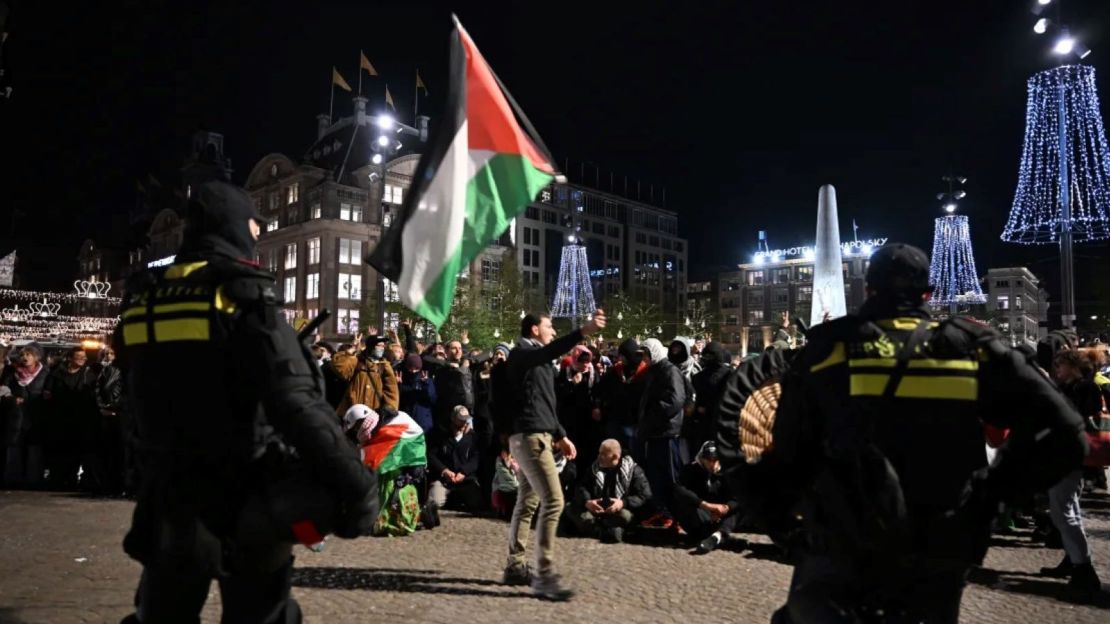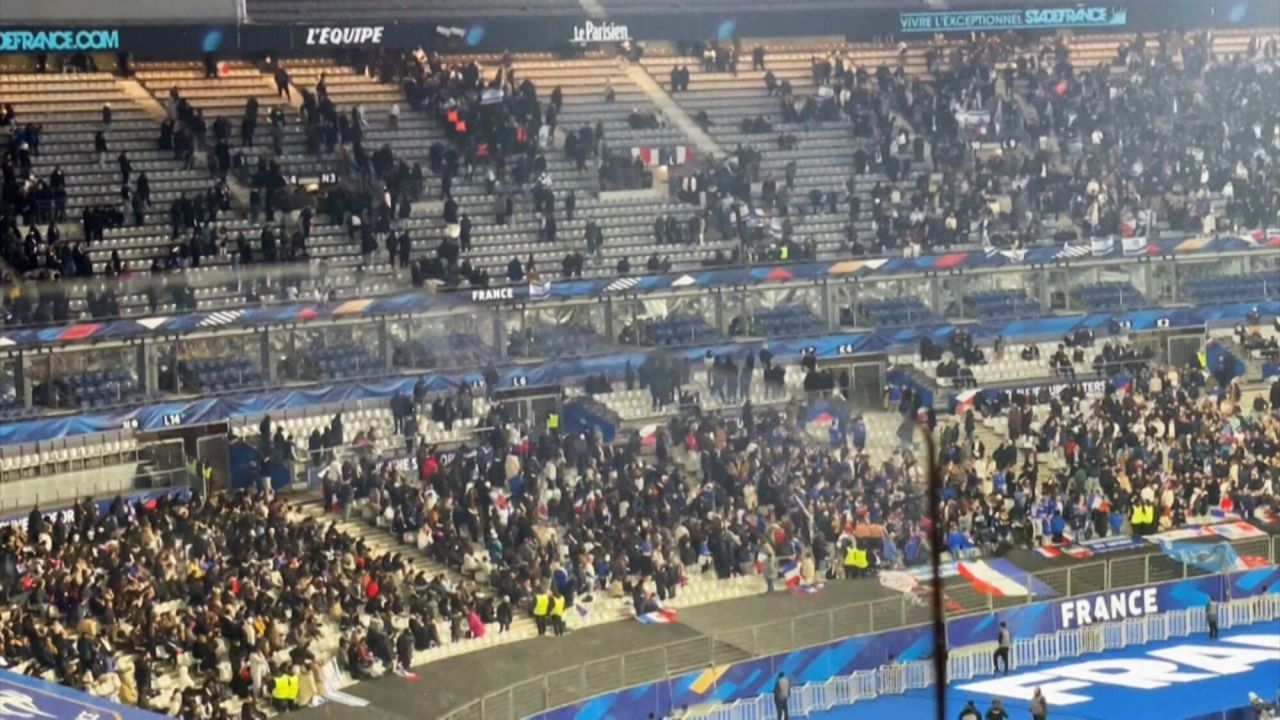() – Anger, fear and anxiety are still latent in Amsterdam.
Last week, Israeli soccer fans were attacked in the streets, Palestinian flags were torn from walls and anti-Semitic insults were shouted during riots.
Although the Dutch capital now appears calm, residents and lawmakers fear tensions have not yet peaked.
“It’s not just anti-Semitism, it’s also racism against Muslims. It is also xenophobia. “We are seeing an increase in all these types of discrimination and racism,” Councilor Sheher Khan, leader of a local party seeking to address institutional racism and Islamophobia, told .
“And I don’t even think, I’m sorry to say, that we have reached the boiling point, because the root causes of the tensions have not been addressed.”
Khan said the biggest underlying problem for his constituents is the Dutch government’s complicity in funneling weapons and money into Israel’s war in Gaza. The Muslim community in the Netherlands numbers approximately one million people, and many have openly expressed their support for the Palestinians.
“In addition, we have a far-right government that is determined to blame social problems on minorities, especially Muslims,” Khan added.
However, the timeline of how tensions began in Amsterdam varies depending on which community you ask.
Some residents argue that the trigger was last week, when Maccabi Tel Aviv fans tore down Palestinian flags, vandalized taxis and paraded through the streets shouting racist slogans, such as “f*** the Arabs,” and celebrating the attacks. Israeli military in Gaza.
What followed were violent attacks on Israeli fans, with several people injured and five hospitalized. The city’s mayor reported that the rioters acted in small groups carrying out anti-Semitic “hit and run” attacks, looking for Maccabi fans in the city.
On Monday, a tram in western Amsterdam was set on fire and stones were thrown at police officers. In a video circulating on social media, a small group of rioters can be heard shouting anti-Semitic insults. Police said they had arrested 68 people in total in connection with the unrest, including 10 Israeli citizens.
Other Amsterdam residents maintain that tensions have been brewing for 15 or 20 years, with the rise of the far right and the rise of anti-Semitism and xenophobia in Europe.

“It’s like a cocktail of emotions: anti-Semitism, hatred of Muslims, the attacks in Amsterdam, the war between Israel and Palestine,” Councilor Itay Garmy told . Garmy, a Dutch-Israeli citizen, urged that one be precise when speaking about the events of the past week.
“I feel like some people are downplaying anti-Semitism by not mentioning it or saying that because of the Maccabi fans, the violence was justified or that it was only directed at them,” Garmy said. He added that fear is palpable among Jewish residents, especially after social media posts that spoke of a “Jew hunt,” according to a report by Mayor Femke Halsema.
Some Jewish residents have stopped publicly wearing the Star of David or kippah, and have even changed their names on taxi apps to avoid being identified as Jewish.
“However, I feel that there are leaders, like the Prime Minister of Israel (Benjamin Netanyahu), who are exaggerating the situation for internal political reasons, as is the far-right leader here, Geert Wilders,” Garmy added.
Mayor Halsema and other local authorities have also received criticism from Muslim and pro-Palestinian communities for not highlighting the racist and threatening actions of Maccabi fans in the immediate context of the violence, and offering what they consider a biased version of events.
Garmy and Khan have a long history of organizing shared community dialogues. Both told they believe the only way to overcome prejudice is to talk to the other side.
Khan added that he feels the country’s government is trying to “divide and conquer” Dutch communities.
Last November, a month after the war between Israel and Hamas began in Gaza, the far-right populist Wilders and his Freedom Party (PVV) won the majority of seats in the Dutch parliament, which came as a shock to many due to their anti-Islam, anti-immigration and anti-European Union manifesto.
This Wednesday, Wilders called for a parliamentary debate on the violence against Maccabi fans, and his party proposed the idea of revoking Dutch citizenship from certain people involved in the attacks.
“It’s really very, very manipulative… It just makes everything worse,” Jaïr Stranders, a local theater director and member of the Amsterdam Liberal Jewish Community Board, told . Stranders condemned the harsh rhetoric of the Dutch and Israeli governments.

Riot breaks out during tense soccer match between Israel and France
In the immediate context of attacks on Israelis, Netanyahu urged Dutch authorities to act firmly and even said he would organize evacuation flights. Senior Israeli officials said the violence was reminiscent of centuries-old “pogrom” attacks on European Jews. But in Amsterdam, many local Jewish officials, as well as the mayor, have asked not to use that description.
“What certain politicians are doing on the right, what Netanyahu and Israeli politicians are doing… is just adding fuel to the fire,” Stranders said, adding that certain people in the Jewish community who use charged rhetoric have also increased the fear. “They are just scaring their own community.”
There are about 40,000 Jewish people in the Netherlands, much fewer than before the Second World War, and it is not a homogeneous community. There are secular Jews, Orthodox Jews, Israeli Jews, diaspora Jews and others. Stranders said a key focus now is getting this disparate group to agree to reduce tensions.
Regarding anti-Semitism, he noted that some of it comes from the extreme right, but the anti-Semitism of the extreme left and Muslim communities cannot be ignored either.
“What you see is that when people criticize Israel’s policies and how they conduct their war, sometimes that criticism is directed at Jewish people and even in a hostile way,” he said. Stranders noted that the pro-Palestinian movement sometimes has a “blind spot” about how it makes the Jewish community feel in a city where Jewish life has been constantly under threat, and where synagogues and schools have historically required security protection.
“Maybe at first it started as a criticism of Israel, but then it turns into anti-Semitism,” he said.
At a pro-Palestinian protest on Wednesday, which took place in Amsterdam’s Dam Square despite police banning demonstrations in the area, some of the chants were clearly anti-war. “Stop the bombings,” chanted protesters, mostly young leftists, as law enforcement officers finally evicted them from the square and moved them to a park where they were allowed to protest.
“I’m here because of the bombing of children and women in Gaza,” said Said Alawi, an older man who stood by before police asked people to disperse.
Alawi lives in Amsterdam but grew up in Morocco. “I just ask that you release these people, that you release Palestine, that’s all.”
However, other chants, such as “f*** Israel,” were clearly more hostile.
Religious leaders of the Muslim community are working together with the Police and local authorities to promote de-escalation and even speak to young people at the protests.
A local imam and leader of Moroccan mosques in the Noord-Holland region, Abdelaziz Chandoudi, is holding a dialogue with taxi drivers in Amsterdam this Friday to try to ease tensions. He is also using his sermons this week to urge parents to speak to their children and other young people, asking for peace and compassion.
“From day one we have tried to use the mosques to calm the situation. At the end of the day, the most important thing is safety,” Chandoudi told . But he added that it is not correct to blame young Moroccans for the unrest, as some Dutch media outlets and right-wing politicians have done. “They are young Dutch people,” he said, adding that Amsterdam is a city of many nationalities and values that can coexist peacefully.
–Mohammed Rasool in Amsterdam contributed to this report.















Add Comment